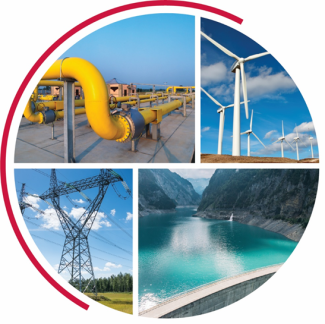Through its Energy Policy Activity, USAID helps Bosnia and Herzegovina attract investment and integrate its energy market into regional and EU markets.
As one of Bosnia and Herzegovina’s (BiH) most important export sectors, the energy sector has the potential to be a major engine for economic growth in BiH. The sector is also relevant for the country’s accession to the EU, as development of competitive energy markets is required by the EU and the Energy Community Treaty. Meanwhile, the country is 100 percent dependent on a single source and pipeline for natural gas: Russia. BiH energy sector stakeholders need assistance not only to diversify the country’s source of gas supply but also to establish an investor-friendly legislative and regulatory framework and integrate the energy sector into regional and EU energy markets.
USAID ASSISTANCE
Launched in September 2019, USAID's Energy Policy Activity is helping BiH coordinate, manage, and improve transparency in the gas and electricity sectors while providing targeted technical assistance to improve and simplify the energy policy environment and legal framework. Through this project, USAID develops and/or recommends legislative and other measures at all levels of government to ensure that the BiH energy sector is compliant with EU requirements. The project also supports a strong public outreach and awareness program to promote a market-based energy sector and educate general public about the benefits of the changes taking place in the energy sector.
Creating a transparent and competitive legislative and regulatory framework and integrating BiH’s energy sector into regional and EU markets is essential for encouraging Western investors to engage in local energy projects, which will have the additional benefits of diversifying sources of natural gas, preventing corruption, and enhancing energy security.
USAID's implementing partner for this five-year, $7.5 million project is DT Global, Inc.
IMPLEMENTATION AND EXPECTED RESULTS
USAID’s Energy Policy Activity will assist BiH stakeholders in transforming the energy sector to reach its full potential as an engine of economic growth, particularly in the natural gas and electricity subsectors.
- In the natural gas sector, BiH needs to adopt laws and regulations that provide for market opening, customer protection, and transparent pricing. It also needs to increase the security of gas supply by diversifying its supply routes. USAID assists BiH stakeholders to reform and restructure the internal natural gas sector in accordance with the Energy Community Treaty obligations and best international practices, and to create the preconditions to join the regional natural gas market. New legislation will include changes in licensing and tariffs. A transparently regulated and competitive gas sector will provide better opportunities for gas companies and customers alike. .
- In the electricity sector, USAID is working to establish a fully functional market that will provide new opportunities for buying and selling electricity and thus improve competitiveness. USAID is also streamlining and simplifying the permitting system in BiH by developing a customized permitting guide for investors. USAID is helping BiH develop and establish a systematic and sustainable mechanism for financing end-user energy efficiency measures, which will in turn create jobs and attract investment. A fully functional and competitive electricity market – equipped with all the necessary features, such as a competitive wholesale market and demand-side response – will ensure BiH remains a net exporter of electricity.
Through this project, USAID also assists the BiH Ministry of Foreign Trade and Economic Relations and relevant entity ministries in improving energy strategies and action plans, including the development of the National Energy and Climate Plans. Additionally, USAID is helping BiH develop a cyber security roadmap for the energy sector.
USAID is helping BiH conduct innovative public outreach and educational activities to promote a market-based energy sector by informing the general public about the benefits of (and EU requirements for) the new energy sector changes. USAID assists the three regulatory commissions to expand their websites platforms to provide customers with transparent information and the ability to compare energy prices – and thus choose retail suppliers for themselves.

